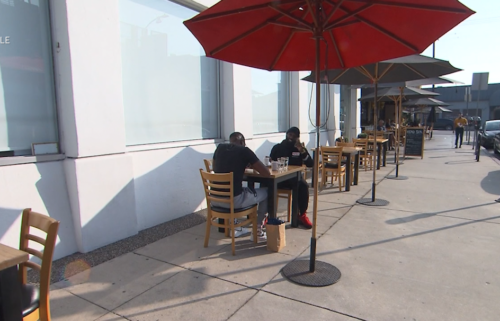Four ways to think about Trump’s Syria decision — Meanwhile in America
This might be Donald Trump’s most unpopular foreign policy decision yet.
His withdrawal from northeastern Syria has united America’s allies, Democrats who want him gone, and even usually supine Republicans in condemnation. Here are a few ways to think about this moment in Trump’s presidency:
Morality: Trump’s decision leaves Kurdish allies who bled alongside America in the fight against ISIS at the mercy of Turkey, which considers them terrorists. Civilians are fleeing en masse. Once the world’s policeman, the US has turned its back on a potential bloodbath in the making. And it looks more than ever like a fair weather friend.
Leadership: Trump acted from his gut, swayed yet again by a phone call with a foreign strongman — this time Turkish President Recep Tayyip Erdogan. The President lacked deep knowledge of the history, snubbed his advisers, and then shifted blame after being stung by critics. The commander-in-chief now says he opposes Turkey’s attack. Turkey says he knew exactly what it planned.
Sign up here for more analysis of US politics for global readers
Strategy: This sends a clear signal: America is ceding leverage in the Middle East. Russia is happy. And so is Iran, even though US policy is supposedly aimed at eroding Tehran’s regional clout. Turkey’s offensive creates a serious risk of a new refugee crisis — and an ISIS resurgence. But Trump, who dislikes the EU, says captured jihadis who end up freed in the chaos can go back to Europe.
Politics: Who isn’t complaining? Trump’s base and millions of Americans who think the US should stay out of Middle East rivalries. The political narrative is simple: Trump said he’d smother ISIS and get troops home. And he did. Whether that makes America or the world safer is another question. But nuance never stopped Trump from claiming a win.
“This is just chaos”
That’s how General John Allen, a former presidential envoy for countering ISIS, described Trump’s decision-making about Syria to CNN’s Christiane Amanpour. “This is just chaos. We don’t do strategy — we shouldn’t be doing foreign policy by tweet,” Allen said.
‘They didn’t help us in Normandy’
Asked about the America’s Kurdish allies in northeastern Syria, Trump responded — quoting an unnamed column — that the Western Asian ethnic minority “didn’t help us in Normandy.“
Turkey hits Syria, in brief
Turkey launched an air and ground offensive in Syria, after the US removed troops from the area. Here’s what you need to know, in brief:
- On Sunday, the White House announced it would withdraw from northeast Syria, leaving Turkey to begin a “long planned operation.”
- Kurdish-led forces in the area warned the shift could create “a vacuum that ISIS will certainly use” and a “humanitarian catastrophe” if Turkey attacked. The Kurds have been America’s staunchest allies in the war against ISIS.
- Bombs began to fall on Wednesday. “Our aim is to destroy the terror corridor which is trying to be established on our southern border and to bring peace and peace to the region,” Erdogan tweeted.
- Erdogan worries that Kurds in Syria will establish an autonomous area next to Turkey’s border. He has already cracked down on Kurdish nationalism domestically, and considers the armed Kurdish People’s Protection Units (YPG), which operates in northeastern Syria, to be a terror organization.
- Turkey plans to create a 400km (about 250 mile) buffer on the Syrian side of the border, and to resettle 2 million Syrian refugees there. But the Kurds say they won’t give up the territory without a fight. Read more from CNN’s Fred Pleitgen here.
Health advisory
The oldest 2020 presidential candidate insists he’s still feeling the Bern.
After a heart attack, 78-year-old Bernie Sanders seemed to suggest he would slow the pace of his campaign. But stung by politically damaging reports that he was slowing down, he now says he “misspoke.”
His reversal is not surprising: Ceding ground for health reasons is dangerous for any candidate — especially for one who deflected questions about age by pointing to his breakneck campaign schedule. But there’s no doubt Sanders has been more reflective since his scare, saying he should have listened more to his body. Usually he sees such personal talk as a distraction from “issues” — a word the native Brooklynite relishes as if munching a delicious pastrami sandwich.
I last saw Sanders a few weeks back under a beating sun in New Hampshire. Red-faced and with sweat spotting his pate until he called for a baseball cap, Sanders pounded out a soliloquy bashing billionaires, which he repeats up to four times daily.
An American presidential race is the most grueling experience in democratic politics, yet this one has four candidates whose ambition keeps them chasing power into their 70s. While most countries wrap up elections in a matter of weeks, US campaigns mean hundreds of rallies, endless TV interviews, late night flights, bad food and fitful sleeps in scrubby hotels.
As the vote nears, candidates flee the sunset, flying west to extend campaign days, before returning east in the early hours to catch an early morning crowd.
Warning: Running for president can endanger your health.
Number of the day: 182
That’s the number of judges that Trump says he’ll have appointed “soon.” Pumping the country’s judiciary with conservative appointees is a selling point for voters — but it’s also one of the accomplishments that will outlast Trump’s presidency, potentially pulling the country rightward whether he wins 2020 or not.
This was originally published as the October 10 edition of email newsletter ‘Meanwhile in America.’ Sign up here to receive it every morning of the week.


